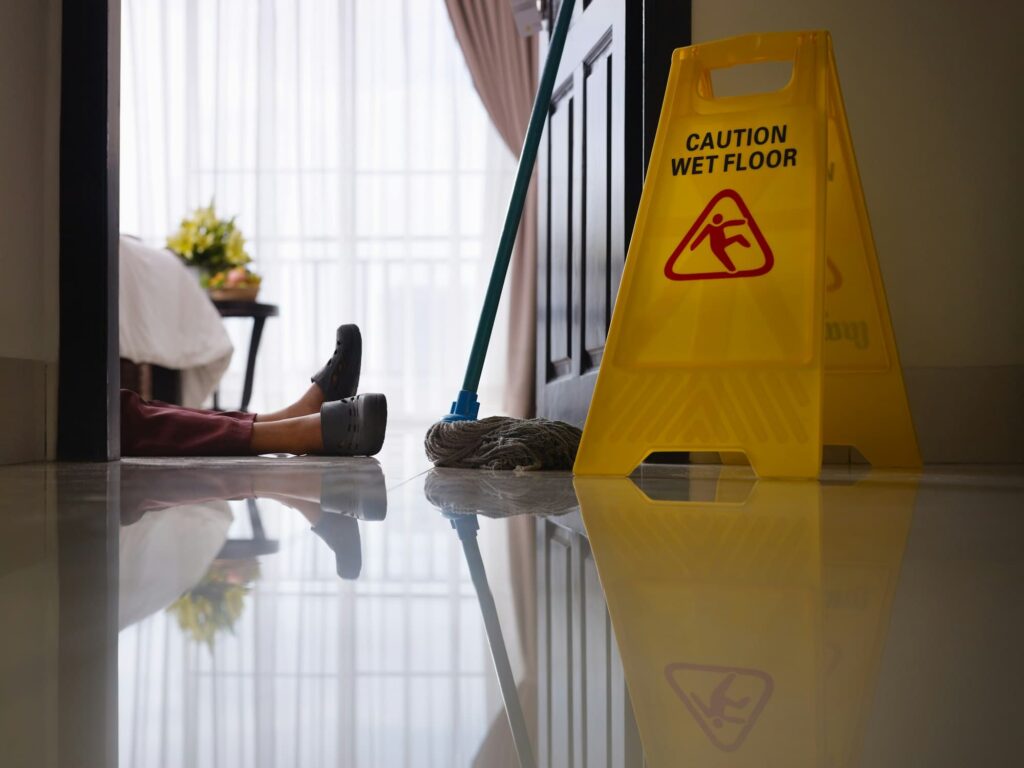Slip and fall hazards inside large Florida retail stores often develop from a combination of environmental conditions and equipment failures. One of the most overlooked contributors to these accidents is the shopping cart itself. A cart with a sticking wheel, uneven alignment, or structural instability can cause sudden shifts in balance that put customers at risk. When this instability interacts with common hazards like spilled liquids or cluttered aisles, the danger increases dramatically. Chalik and Chalik, who represent injured individuals throughout Florida, frequently examine how both defective equipment and unsafe premises contribute to serious slip and fall injuries.
A defective cart can trigger a fall even when the floor appears safe. A wheel that locks unexpectedly can jerk the cart forward, causing a shopper to stumble. A cart that veers sharply can pull a customer into an aisle display or force them off balance near a slick surface. Many of these situations are analyzed in educational resources such as the Slip and Fall Injury Claims Department, which explains how mechanical issues often play a hidden role in retail injury cases. Because most customers expect the carts to function normally, they rarely anticipate these dangers.
Under Florida premises liability law, stores have a legal duty to maintain both their premises and their equipment in safe condition. Shopping carts, like floors and shelving, must be inspected regularly. When Walmart or another retailer fails to identify worn wheels, loose frames, or destabilized components, they may be held responsible for injuries caused by those defects. Constructive knowledge plays an important role in these cases. If the defect existed long enough for employees to discover it, or if the same problem has occurred repeatedly, the law may find that the store should have taken corrective action.
Evidence gathering becomes especially important when a defective cart is involved in a slip and fall. The cart itself may be the most crucial piece of evidence, but stores occasionally repair or discard it before it can be examined. Customers injured in these incidents should report the problem immediately and request preservation of the cart. Surveillance footage can help show whether the cart malfunctioned, whether employees noticed issues earlier in the day, or whether other customers struggled with the same unit. Chalik and Chalik often act quickly to secure video evidence and prevent its loss.
Another issue arises when defective equipment interacts with common floor hazards. A cart with misaligned wheels may yank a shopper toward a spill they would otherwise have avoided. A sticking wheel may prevent a shopper from maneuvering safely around clutter. When two hazards combine, the result can be a stronger liability case. Attorneys must determine whether the fall resulted solely from the defective equipment, from the floor hazard, or from the combination of both. This analysis matters because Florida applies a modified comparative negligence standard that allocates responsibility between the involved parties.
Employee training is a significant factor in determining liability. Retail staff are generally instructed to identify equipment defects, remove damaged carts from circulation, and report recurring problems. However, high turnover rates and understaffed shifts often prevent consistent implementation of these policies. Employees may overlook obvious signs of wear or choose to leave defective carts in use during busy hours. When reviewing a case, attorneys frequently examine whether workers were properly trained to identify dangerous equipment and whether maintenance protocols were actually followed.
Medical documentation remains one of the strongest forms of evidence in any slip and fall claim. Falls caused by defective carts often involve sudden forward momentum or awkward twisting motions. These movements can cause knee injuries, rotator cuff tears, wrist fractures, and head trauma. Immediate medical evaluation helps establish that the accident directly caused the injuries, while ongoing care documents their severity. Stores and insurers may attempt to argue that injuries preexisted the fall, which is why detailed records play such a critical role in proving causation.
Defective cart claims also require careful analysis of store inspection logs, maintenance procedures, and repair schedules. If the store had no system for monitoring cart conditions, or if the records show gaps in inspection, this may support a finding of negligence. A long history of customer complaints about the same style or batch of carts can also indicate constructive knowledge. Chalik and Chalik often compare maintenance paperwork with witness statements and video evidence to identify discrepancies that strengthen the injured customer’s case.
In some situations, the store’s defense may center on claims that the shopper misused the cart or ignored visible signs of damage. But customers are not expected to perform mechanical inspections before shopping. Florida law recognizes that shoppers rely on stores to provide safe equipment. If a cart malfunctioned in a way that a reasonable customer could not anticipate, the responsibility lies with the retailer to explain how the defect went unnoticed despite having a duty to maintain safe premises.
For anyone injured in Florida due to a slip and fall involving a defective shopping cart, speaking with an experienced Florida personal injury lawyer can provide important clarity. Chalik and Chalik help injured individuals understand how equipment failures, floor hazards, and corporate procedures interact under Florida law. With the right evidence and legal guidance, victims can pursue fair compensation and hold retailers accountable for failing to keep their stores safe

